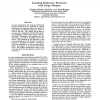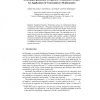1863 search results - page 260 / 373 » Unifying Theories of Objects |
ICML
2000
IEEE
14 years 8 months ago
2000
IEEE
In manyoptimization and decision problems the objective function can be expressed as a linear combinationof competingcriteria, the weights of whichspecify the relative importanceo...
ISBI
2004
IEEE
14 years 8 months ago
2004
IEEE
In this paper we propose a method for gene ranking from microarray experiments using multiple discriminants. The novelty of our approach is that a gene's relative rank is det...
CP
2009
Springer
14 years 8 months ago
2009
Springer
Equidistant Frequency Permutation Arrays are combinatorial objects of interest in coding theory. A frequency permutation array is a type of constant composition code in which each ...
PODS
2006
ACM
14 years 8 months ago
2006
ACM
We initiate a novel study of clustering problems. Rather than specifying an explicit objective function to optimize, our framework allows the user of clustering algorithm to speci...
ICSE
2005
IEEE-ACM
14 years 8 months ago
2005
IEEE-ACM
Aspects cut new interfaces through the primary decomposition of a system. This implies that in the presence of aspects, the complete interface of a module can only be determined o...


